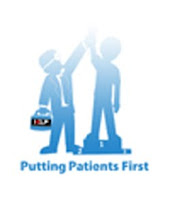Docs use comic books, DVDs to help patients
MUMBAI: If infertility treatment sounds like jargon, dial the newest helpline in town and let the recorded voice educate you. Information about health is as accessible and easy as phone-banking nowadays. If the interactive voice recording system on the phone is too distant for your liking, try a comic book for an update on infertility management. Colourful boxes and narration make the most complex medical topics come alive. In fact, comics on HIV\AIDS, infertility and malaria are already available at some doctors' clinics and hospitals in the city.
Welcome to the desi world of patient education; it is no longer an alien concept found only in the West. In the city's clinics and hospitals, doctors and patients themselves are working out innovative ways to disburse health-related information. Dr Aniruddha Malpani launched an infertility helpline two weeks ago because he wanted to offer his patients a bouquet of information hubs. "Our clinic in Colaba has comic books that we specially developed for our patients. But a helpline helps the patient prepare for a session with an infertility specialist," he said.
Health information for patients can now be more than just about Googling on the net. Nutritionist Rujuta Diwekar wrote books on weight-loss and her celebrity size-zero client Kareena Kapoor and made it to the national best-sellers' list. Ghatkopar youngster Parag Vora has created a niche market by making CDs and DVDs on 83 health topics such as angioplasty, Caesarean section or stroke. "Five years ago, I started with eight topics and a handful of doctors in the central suburbs. My CDs are now bought by over 1,700 doctors across the country," said Parag.
Eye surgeon Dr S Natarajan begins his interaction with most patients with a virtual tour of the 3D Eye programme on his iMac. "Patients should understand their problems so that they have realistic expectations from their doctor," he said.
And herein lays the importance of patient education. Research done in leading hospitals in the US has shown that patient education improves communication between health care providers and patients. Studies done for management of chronic diseases such as cancer, diabetes and hypertension have shown that patients who were counseled and given educational material brought their disease in control faster than others who were not.
The evolution of patient education in India has been slow mainly because it doesn't have a sponsor. It is left to the doctors and patient support groups to educate patients. Said Dr Ankit Khambati of Cheeny Kum, a website that provides diabetes management for patients, "Most doctors in India don't spend time educating patients. They are hard-pressed for time. We have tried to plug this gap with our website that provides information and support on management of diabetes."
The Web as a large role to play here. "Technology in India is available at less than one-fifth the cost in the US. We can thus use technology to educate patients," said Dr Malpani, who also offers a web-based SMS service to patients who want to track their fertile days of the month.
Most important, this kind of education provides a reality check for patients, said doctors. "The patient-doctor relationship has suffered in the past because of a breakdown in communication lines. By educating the patients about what to expect from a treatment bridges this gap," said Malpani. Natrajan feels patients don't expect miracles after they are explained the facts of a surgery in a manner that they understand.



No comments:
Post a Comment